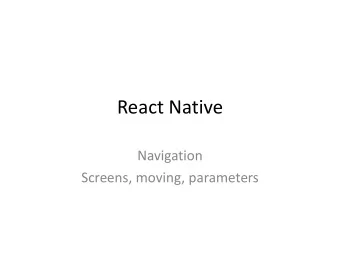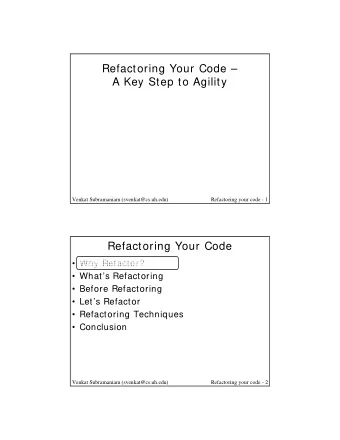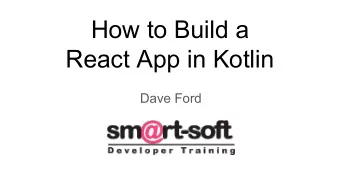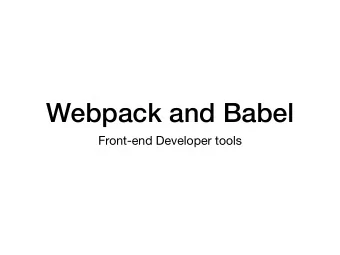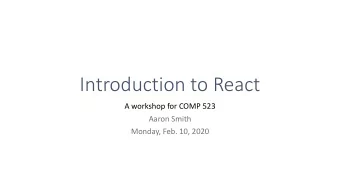
Refactoring Into React Hooks Matteo Antony Mistretta Inglorious - PowerPoint PPT Presentation
Refactoring Into React Hooks Matteo Antony Mistretta Inglorious Coderz @antonymistretta Why They separate stateful logic They are composable functions They keep our component hierarchy flat They allow us to go fully functional They are now
Refactoring Into React Hooks Matteo Antony Mistretta Inglorious Coderz @antonymistretta
Why They separate stateful logic They are composable functions They keep our component hierarchy flat They allow us to go fully functional They are now stable
Separation Of Concerns 0:00 Pavel Prichodko's tweet
antony@ingloriouscoderz ~> whoami
Let's refactor... 1. State 2. Refs and Instance Attributes 3. Lifecycle Methods 4. Higher-Order Components 5. Render Props 6. Context API 7. Reducers 8. Redux
class MyComponent extends Component { state = { text: 'Hello world!' } handleChange = event => { Hello world! this.setState({ text: event.target.value }) } render() { const { text } = this.state return ( Hello world! <> <h1>{text}</h1> <input value={text} onChange={this.handleChange} /> </> ) } } render(MyComponent)
function MyComponent() { const [text, setText] = useState('Hello world!') const handleChange = event => setText(event.target.value) Hello world! return ( <> <h1>{text}</h1> <input value={text} onChange={handleChange} /> </> ) Hello world! } render(MyComponent)
Let's refactor... 1. State 2. Refs and Instance Attributes 3. Lifecycle Methods 4. Higher-Order Components 5. Render Props 6. Context API 7. Reducers 8. Redux
class MyComponent extends Component { myRef = React.createRef() Hello worl Focus! handleClick = () => this.myRef.current.focus() render() { return ( <div className="input-group"> <input defaultValue="Hello world!" ref={this.myRef} /> <button onClick={this.handleClick}>Focus!</button> </div> ) } } render(MyComponent)
function MyComponent() { const myRef = useRef() const handleClick = () => myRef.current.focus() Hello worl Focus! return ( <div className="input-group"> <input defaultValue="Hello world!" ref={myRef} /> <button onClick={handleClick}>Focus!</button> </div> ) } render(MyComponent)
Let's refactor... 1. State 2. Refs and Instance Attributes 3. Lifecycle Methods 4. Higher-Order Components 5. Render Props 6. Context API 7. Reducers 8. Redux
class MyComponent extends Component { state = { play: false, count: 0 } toggle = () => this.setState(({ play }) => ({ play: !play })) 0 tick = () => this.setState(({ count }) => ({ count: count + 1 })) start = () => (this.interval = setInterval(this.tick, 1000)) stop = () => clearInterval(this.interval) componentDidMount() { const { play } = this.state Play if (play) { this.start() } } componentDidUpdate(prevProps, prevState) { const { play } = this.state if (play !== prevState.play) { if (play) { this.start() } else { this.stop() } } } componentWillUnmount() { this.stop() } render() { const { count, play } = this.state return ( <> <h1>{count}</h1> <button onClick={this.toggle}>{play ? 'Pause' : 'Play'}</button> </> ) } } render(MyComponent)
function MyComponent() { const [play, setPlay] = useState(false) const [count, setCount] = useState(0) const toggle = () => setPlay(play => !play) 0 useEffect(() => { let interval = null const tick = () => setCount(count => count + 1) const start = () => (interval = setInterval(tick, 1000)) Play const stop = () => clearInterval(interval) if (play) { start() } else { stop() } return () => stop() }, [play]) return ( <> <h1>{count}</h1> <button onClick={toggle}>{play ? 'Pause' : 'Play'}</button> </> ) } render(MyComponent)
Let's refactor... 1. State 2. Refs and Instance Attributes 3. Lifecycle Methods 4. Higher-Order Components 5. Render Props 6. Context API 7. Reducers 8. Redux
const enhance = compose( withState('text', 'setText', 'Hello world!'), withHandlers({ onChange: ({ setText }) => event => setText(event.target.value), Hello world! }), pure, ) function MyComponent({ text, onChange }) { return ( Hello world! <> <h1>{text}</h1> <input value={text} onChange={onChange} /> </> ) } render(enhance(MyComponent))
function useText() { const [text, setText] = useState('Hello world!') const handleChange = event => setText(event.target.value) return { value: text, onChange: handleChange } Hello world! } function MyComponent() { const text = useText() return ( <> Hello world! <h1>{text.value}</h1> <input {...text} /> </> ) } render(memo(MyComponent))
Let's refactor... 1. State 2. Refs and Instance Attributes 3. Lifecycle Methods 4. Higher-Order Components 5. Render Props 6. Context API 7. Reducers 8. Redux
function Parent() { return ( <Toggler T urn on defaultOn={false} render={({ on, toggle }) => <Child on={on} toggle={toggle} />} /> ) } function Child({ on, toggle }) { return <button onClick={toggle}>{on ? 'Turn off' : 'Turn on'}</button> } class Toggler extends Component { state = { on: this.props.defaultOn } toggle = () => this.setState(({ on }) => ({ on: !on })) render() { const { render } = this.props const { on } = this.state return render({ on, toggle: this.toggle }) } } render(Parent)
function Parent() { const toggler = useToggler(false) return <Child {...toggler} /> T urn on } function Child({ on, toggle }) { return <button onClick={toggle}>{on ? 'Turn off' : 'Turn on'}</button> } function useToggler(defaultOn) { const [on, setOn] = useState(defaultOn) const toggle = useCallback(() => setOn(!on), [on]) return { on, toggle } } render(Parent)
Let's refactor... 1. State 2. Refs and Instance Attributes 3. Lifecycle Methods 4. Higher-Order Components 5. Render Props 6. Context API 7. Reducers 8. Redux
const UserContext = createContext() const ThemeContext = createContext() function Parent() { Hello return ( <UserContext.Provider value="Antony"> <ThemeContext.Provider value={{ color: '#e06c75' }}> Antony! <Child /> </ThemeContext.Provider> </UserContext.Provider> ) } function Child() { return ( <UserContext.Consumer> {user => ( <ThemeContext.Consumer> {theme => <h1 style={theme}>Hello {user}!</h1>} </ThemeContext.Consumer> )} </UserContext.Consumer> ) } render(Parent)
const UserContext = createContext() const ThemeContext = createContext() function Parent() { Hello return ( <UserContext.Provider value="Antony"> <ThemeContext.Provider value={{ color: '#e06c75' }}> Antony! <Child /> </ThemeContext.Provider> </UserContext.Provider> ) } function Child() { const user = useContext(UserContext) const theme = useContext(ThemeContext) return <h1 style={theme}>Hello {user}!</h1> } render(Parent)
Let's refactor... 1. State 2. Refs and Instance Attributes 3. Lifecycle Methods 4. Higher-Order Components 5. Render Props 6. Context API 7. Reducers 8. Redux
function counter(state = 0, action) { const { type, payload } = action switch (type) { case 'INCREMENT': 0 return state + 1 case 'DECREMENT': return state - 1 case 'SET_COUNT': return payload default: -1 0 +1 return state } } const enhance = compose( withReducer('count', 'dispatch', counter, 0), withHandlers({ increment: ({ dispatch }) => () => dispatch({ type: 'INCREMENT' }), decrement: ({ dispatch }) => () => dispatch({ type: 'DECREMENT' }), setCount: ({ dispatch }) => value => dispatch({ type: 'SET_COUNT', payload: value }), }), withHandlers({ handleChange: ({ setCount }) => event => setCount(parseInt(event.target.value)), }), ) function Counter({ count, increment, decrement, handleChange }) { return ( <> <h1>{count}</h1> <div className="input-group"> <button onClick={decrement}>-1</button> <input type="number" value={count} onChange={handleChange} /> <button onClick={increment}>+1</button> </div> </> ) } render(enhance(Counter))
function useCounter() { const [count, dispatch] = useReducer(counter, 0) const increment = () => dispatch({ type: 'INCREMENT' }) const decrement = () => dispatch({ type: 'DECREMENT' }) 0 const setCount = value => dispatch({ type: 'SET_COUNT', payload: value }) const handleChange = event => setCount(parseInt(event.target.value)) return { count, increment, decrement, handleChange } } function Counter() { -1 0 +1 const { count, increment, decrement, handleChange } = useCounter() return ( <> <h1>{count}</h1> <div className="input-group"> <button onClick={decrement}>-1</button> <input type="number" value={count} onChange={handleChange} /> <button onClick={increment}>+1</button> </div> </> ) } render(Counter) function counter(state = 0, action) { const { type, payload } = action switch (type) { case 'INCREMENT': return state + 1 case 'DECREMENT': return state - 1 case 'SET_COUNT': return payload default: return state } }
Let's refactor... 1. State 2. Refs and Instance Attributes 3. Lifecycle Methods 4. Higher-Order Components 5. Render Props 6. Context API 7. Reducers 8. Redux
Recommend
More recommend
Explore More Topics
Stay informed with curated content and fresh updates.
